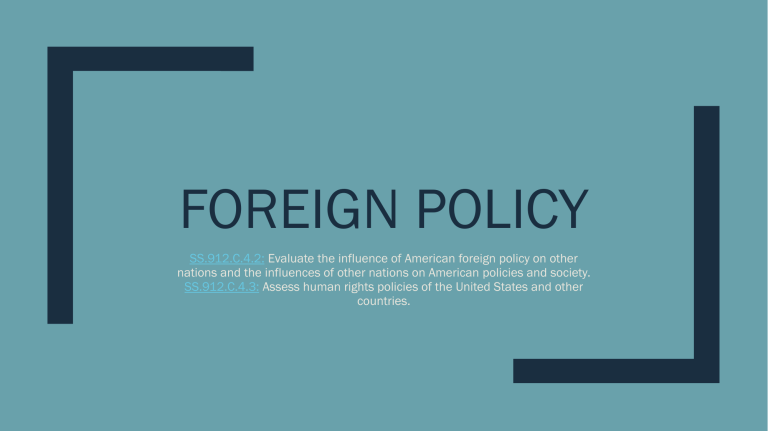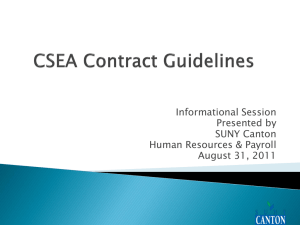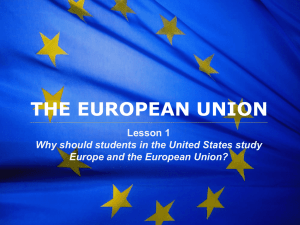
FOREIGN POLICY SS.912.C.4.2: Evaluate the influence of American foreign policy on other nations and the influences of other nations on American policies and society. SS.912.C.4.3: Assess human rights policies of the United States and other countries. For each of these foreign policy goals, decide if it’s (N) not important, (S) somewhat important or (V) very important to you. ■ Preventing future acts of international terrorism ■ Preventing the spread of weapons of mass destruction ■ Securing adequate supplies of energy for the U.S. ■ Defending the security of our allies ■ Promoting and defending human rights in other countries ■ Working with the United Nations to bring about world cooperation ■ Helping other countries build democracies ■ Promoting economic development in other countries Compare your answers to your table partner’s. Then together, answer these questions: ■ Can you think of a hypothetical or real situation that illustrates competing goals? ■ Pursing foreign policy costs money and has risks. Choose one goal and imagine a situation in which the American people have a lot to gain or a lot to lose. GOALS OF US FOREIGN POLICY How do the US government’s foreign policy goals affect political, economic, and security interests at home and abroad? What is foreign policy? ■ Foreign policy consists of goals and strategies that guide a nation’s relations with other countries and groups in the world. ■ Strategies may change from year-to-year ■ Long-term goals of that policy remain constant – This reflects both the nation’s ideals and its self-interest Foreign Policy Goals of the US ■ Security Interests (National Security) ■ Economic Interests ■ World Peace ■ Promoting Democracy ■ Concern for Humanity Security Interests ■ This is the principle goal of American foreign policy – Preserving the security of the United States ■ National Security – Protection of a nation-its lands and people-from foreign threats – Whether from governments, organized groups, or individual terrorists ■ This goal is most important one because no nation can achieve its other foreign policy goals if it’s under attack – Can’t improve its education system, or provide better health care if it’s at war with other countries or under attack from terrorists Economic Interests ■ Maintaining trade with other nations and promoting America’s economic interests are the basic goals of this policy ■ American factories and farms rely on foreign countries to buy and sell their goods ■ The US also works to preserve access to natural resources that we import (get from other countries) ■ While the US does support trade that’s free from both import and export restrictions, it does limit trade in some ways to protect its own domestic industries and worker from foreign competition. World Peace ■ American leaders work for peace because they believe it helps the nation avoid outside conflicts and aids national security. ■ The US tries to help other nations through a number of ways: – Settle disputes – Supplies economic aid to at-risk countries ■ This can help to prevent uprisings and revolutions ■ After the end of World War II, the US helped to create the United Nations (the UN) which helps promote world peace ■ The US also works with many other international organizations, such as the North Atlantic Treaty Organization (NATO), to prevent regional conflicts Promoting Democracy ■ The US is often seen as a democratic model for other countries. ■ Most American leaders believe that promoting democracy elsewhere is good for the U.S. and for the people in those countries. ■ Democracy aligns with our fundamental values and helps to create a more secure and stable global arena and good trade partners. ■ Why democracy? Supporters say it helps people around the world because it: – protects people’s rights – combats international terrorism and crime – promotes human health. ■ Not all Americans agree with the idea that democracy is best. Some believe that the United States should not intervene to promote democracy in other countries because the costs are too great and the outcomes uncertain. Concern for Humanity ■ The United States has often demonstrated its concern for others. ■ Victims of natural disasters or starvation have looked to the United States for help. ■ the US has often responded by: – providing food – medical supplies – technical assistance for humanitarian reasons. ■ Not only does it help those countries in need, this aid serves the strategic interests of the United States by maintaining political stability in the world. Global Issues ■ Some issues that foreign policy goals try to address include: ■ International Terrorism – Terrorism is the unlawful use of violence and intimidation, especially against civilians, usually in the pursuit of political aims. While domestic terrorism is still common, international terrorism has become a serious problem in the global era. ■ Human Trafficking – Human trafficking is the trade in human beings. It involves holding people captive, usually for the purpose of sexual slavery, forced labor, or as the source of organs or tissues for transplanting. Those who take part in this illegal business make a lot of money—approximately $32 billion each year worldwide. Often, traffickers lure victims by promising them good jobs. Those victims then join the millions of people worldwide being held as forced laborers or sex slaves. Many of the victims are women or children. ■ Protecting the Environment – Political issues and technical questions resulting from exploding population growth, increasing consumption of natural resources, and the growing discharge of pollution into the environment raise many difficult global issues. Policy makers and scientists recognize that dealing effectively with such issues requires transnational programs that depend upon international cooperation. HUMAN RIGHTS POLICIES OF THE US Human Rights in the United States ■ The promotion of human rights is an important global interest, and the protection of fundamental human rights is one of the foundations of the United States. ■ Since our country was founded, human rights have been a central goal of U.S. foreign policy. ■ The United States understands that the existence of human rights helps secure the peace, deter aggression, promote the rule of law, combat crime and corruption, strengthen democracies, and prevent humanitarian crises. What are Human Rights? ■ The Founding Fathers believed that all people had certain basic human rights that no one should take away from them-we see evidence of this in our Declaration of Independence and Constitution ■ The US recognizes the Universal Declaration of Human Rights, adopted by the United Nations on December 10, 1948, as the guidelines for human rights around the globe. ■ Through its human rights policies, the US seeks to: – – – – Hold governments accountable to their obligations under universal human rights norms and international human rights instruments; Promote greater respect for human rights, including freedom from torture, freedom of expression, press freedom, women's rights, children's rights, and the protection of minorities; Promote the rule of law, seek accountability, and change cultures of impunity; and Coordinate human rights activities with important allies, including the EU, and regional organizations. Bureau of Democracy, Human Rights, and Labor ■ The Bureau of Democracy, Human Rights, and Labor (DRL) is the government agency that is the authority on human rights in the United States. ■ The DRL applies three key principles to its work on human rights: ■ 1) DRL strives to learn the truth and state the facts in all of its human rights investigations, reports on country conditions, speeches and votes in the UN, and asylum profiles. Each year, DRL develops, edits, and submits to Congress a 5,000page report on human rights conditions in over 190 countries that is respected globally for its objectivity and accuracy. DRL also provides relevant information on country conditions to the Immigration and Naturalization Service and immigration judges in asylum cases. ■ 2) DRL takes consistent positions concerning past, present, and future abuses. With regard to past abuses, it actively promotes accountability. To stop ongoing abuses, the bureau uses an "inside-outside" approach that combines vigorous, external focus on human rights concerns (including the possibility of sanctions) with equally robust support for internal reform. To prevent future abuses, it promotes early warning and preventive diplomacy. Each year DRL ensures that human rights considerations are incorporated into U.S. military training and security assistance programs; promotes the rights of women through international campaigns for political participation and full equality; conducts high-level human rights dialogues with other governments; coordinates U.S. policy on human rights with key allies; and raises key issues and cases through diplomatic and public channels. ■ Third, DRL forges and maintains partnerships with organizations, governments, and multilateral institutions committed to human rights. The bureau takes advantage of multilateral fora to focus international attention on human rights problems and to seek correction. Each year, DRL provides significant technical, financial, or staff support for U.S. delegations to the annual meetings of several international human rights organizations; conducts regular consultations with Native American tribes and serves as the Secretary's principal advisor on international indigenous rights issues; maintains relations with the UN High Commissioner on Human Rights; and supports the creation of effective multilateral human rights mechanisms and institutions for accountability.



